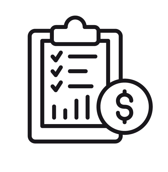An important step toward realizing your financial goals is creating a realistic budget. Budgeting helps you create financial goals, organize your expenses and develop a spending plan.
A budget is simply a spending plan that is based on your expenses and income. A written plan helps you stay on track, day-to-day and month to month, for meeting your financial goals.
Start by making a list of how much money comes in and how it’s spent.

Figure Out Income
Take a look at your paychecks, allowances, and any other regular income you earn on a monthly basis. Add these up to determine your total monthly income.
Calculate Expenses
Required expenses are required costs you pay regularly – these are must haves, such as gas, a monthly cell phone bill, or insurance. Total these costs to determine a baseline of your regular expenses.
Saving & Fun
After you deduct your expenses from income, the remaining can go into your savings account. You could also use these funds for discretionary spending like going to a concert with your friends or purchasing a new outfit. Just remember there are trade offs to spending money – whatever you spend now, you will not be able to put towards bigger purchases and financial goals.
Setting Goals
Setting priorities for your money helps you become prepared to achieve your financial goals. By setting financial goals, you know what you are sacrificing or saving for when making money decisions. Having these written down and consistently in mind will help keep you focused and motivated.
Creating a budget helps you focus your spending on what really matters to you. By budgeting your money, you control your spending habits, rather than letting your spending habits control you. Access our budgeting calculator below to help with your planning!
Student Budget Calcluator